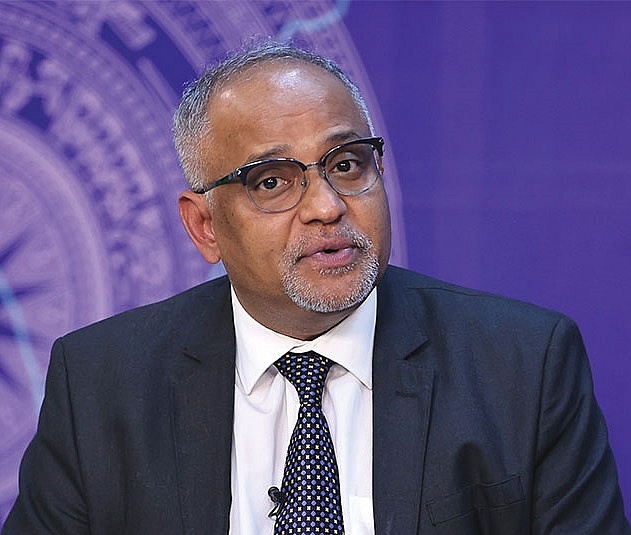Achievable economic goals still in sight for Vietnam
What is your assessment of Vietnam’s economic growth and recovery in recent months?
 |
| Shantanu Chakraborty, country director for Vietnam of the Asian Development Bank |
Data for Q3 showed GDP growth of 5.3 per cent for quarter 3, bringing the 9-month year-on-year growth rate to 4.24 per cent, which is less than half the 8.8 per cent growth seen in the same period last year, and lagging behind the target of 6.5 per cent.
It is noteworthy that the government is revising its target down to 6 per cent for 2023.
In this context, we appreciate the government’s proactive policy responses in an effort to balance macroeconomic stability with supporting socioeconomic development. The macroeconomic policies involve fiscal and monetary measures. So far, the government has promptly moved in the right direction.
The Asian Development Bank’s (ADB) economic projection released in September indicated that Vietnam would still lead growth among peers in Southeast Asia at 5.8 per cent in 2023 and 6 per cent in 2024.
This projection is premised upon early signs of uptick in the services industry and in the construction industry. We are also seeing growth in the agricultural sector, given the robust stability that has been shown in agricultural prices.
So, there are some drivers of the economy that we believe will contribute towards Vietnam achieving a 5.8 per cent economic growth, despite unexpectedly sluggish growth in the first couple of quarters.
Vietnam’s government is now making efforts to keep the inflation rate at about 4 per cent this year. Do you think this target will be achievable?
The monetary and fiscal policies adopted by the government up until now have succeeded in keeping inflation under control. The ADB’s current projection of inflation in Vietnam is 3.8 per cent for 2023, and 4 per cent for 2024.
However, there will be continued certain challenges in terms of the global increase in interest rates, the disruptions caused by certain geopolitical events, and the monetary tightening in some countries.
But overall, given the stability of agricultural production in the country so far, and the fact that oil and gas prices are expected to remain largely stable for the rest of the year, I do believe that, based on the low inflation rates that were experienced by Vietnam in the first half of the year, an overall annual inflation of 3.8 per cent is very much achievable.
What is your take on the outlook of Vietnam’s economy in 2024 and beyond?
While Vietnam’s economy has shown resilience in the context of global economic uncertainty, near-term prospects through 2024 and beyond still face significantly heightened risks coming from the external environment.
In this context, it is crucial that policymakers stay vigilant to ensure timely responses, while efforts continue to boost the domestic economy both through short-term support measures and longer-term reforms.
As said already, the government has been proactive in designing policy response in the right direction, both on fiscal and monetary measures.
Regarding the key growth drivers of the economy in 2024, I think that the biggest priority should be placed on increasing public investment disbursement. By some estimates, there is about $30 billion of public investment that has been planned, so a concerted effort needs to be made to expedite spending the money.
That will boost demand in the market, lead to employment generation, and foster overall economic activities. The government has a comfortable fiscal space to pursue stimulus through borrowings, considering its current public debt to GDP ratio of about 38 per cent against the 60 per cent target.
I believe maintaining the momentum of public investment will be crucial because that is what is going to rejuvenate economic activities, generate employment, and put more money in the hands of people to enhance domestic consumption.
In addition, the importance of consumption must be underscored. Currently, inflation remains low and there is liquidity in the hands of people. Domestic consumption needs to remain strong to offset the adverse impact of slowdown in export-related demand and activities.
For Vietnam’s long-term sustainable development, the government should double down on reform efforts to improve the business environment, especially in the context of green transitioning, addressing climate change and private sector development, and building on its already existing strength as a preferred foreign direct investment destination.
How does Vietnam’s growth compare with other countries in the region and the world?
In our Asian Development Outlook for September, the regional growth forecast was revised down to 4.7 per cent for 2023 and maintained at 4.8 per cent for 2024.
Looking at the global and regional outlook, growth slowed down for most economies in Southeast Asia. This deceleration reflected the cumulative effects of rising inflation, monetary tightening, and weaker global demand for manufactured goods.
Vietnam is among seven economies in the region where the economic outlook is being revised down, together with Cambodia, Laos, Malaysia, the Philippines, Singapore, and Timor-Leste.
Meanwhile, growth forecasts have been maintained for Myanmar and also been raised for Brunei, Indonesia, and Thailand on the brighter domestic demand prospects.
Robust domestic demand and continued recovery of the services sector - particularly tourism - have contributed to better job and income prospects, keeping growth close to its long-run average for the whole of the Southeast Asia region.
It’s useful to look at other major export-oriented economies in the region, who were also affected heavily by the fall in external demand. Singapore, Taiwan, Malaysia, and Thailand all suffered from falling investment demand, likely a consequence of reduced for-export manufacturing.
Also, economies with a sizable domestic market, like India, China, and Indonesia, have better prospects for a higher rate of growth, indicating the importance of domestic demand in the near term.
| Fiscal policy is expected to be expansionary in 2023-24 to boost domestic demand. The fiscal deficit is projected to reach around 1.3 per cent of GDP in 2023. Public wages, frozen since 2019, were set to rise by 20.8 per cent, with an estimated annual budgetary impact of 1.2 per cent of GDP, helping reduce the gap between public and private compensation. Revenues are expected to fall mainly due to weaker economic activity and lower revenues from oil revenues and land use rights. Temporary tax deferrals, cuts in environmental taxes, and cuts to VAT rates and vehicle registration fees in the second half of 2023 will also provide some relief. However, frequent changes to tax rates and excessive use of deferrals add uncertainty to the tax system and can undermine tax collection. Some of the tax cuts are regressive and negatively impact climate and congestion. Instead, policies could focus on spending to address infrastructure and social needs. Further fiscal support could be considered, especially if the economic recovery disappoints. Given the slowdown and the constraints faced by monetary policy, going forward, fiscal policy can take a leading role in supporting aggregate demand. For instance, the government could scale up social safety nets, and consider cash transfers to provide swift relief to poorer households. If the current turmoil proves more damaging to the economy and the financial sector, targeted support could be considered, including help for real estate developers to restructure. Source: International Monetary Fund’s Executive Board |
 | Public investment crucial for Vietnam’s economic growth: ADB director Vietnam’s maintaining the momentum of public investment will be crucial because it will rejuvenate economic activities, generate employment, and enhance domestic consumption, said ADB Country Director for Vietnam Shantanu Chakraborty. |
What the stars mean:
★ Poor ★ ★ Promising ★★★ Good ★★★★ Very good ★★★★★ Exceptional
Related Contents
Latest News
More News
- State corporations poised to drive 2026 growth (February 03, 2026 | 13:58)
- Why high-tech talent will define Vietnam’s growth (February 02, 2026 | 10:47)
- FMCG resilience amid varying storms (February 02, 2026 | 10:00)
- Customs reforms strengthen business confidence, support trade growth (February 01, 2026 | 08:20)
- Vietnam and US to launch sixth trade negotiation round (January 30, 2026 | 15:19)
- Digital publishing emerges as key growth driver in Vietnam (January 30, 2026 | 10:59)
- EVN signs key contract for Tri An hydropower expansion (January 30, 2026 | 10:57)
- Vietnam to lead trade growth in ASEAN (January 29, 2026 | 15:08)
- Carlsberg Vietnam delivers Lunar New Year support in central region (January 28, 2026 | 17:19)
- TikTok penalised $35,000 in Vietnam for consumer protection violations (January 28, 2026 | 17:15)

 Tag:
Tag:


















 Mobile Version
Mobile Version